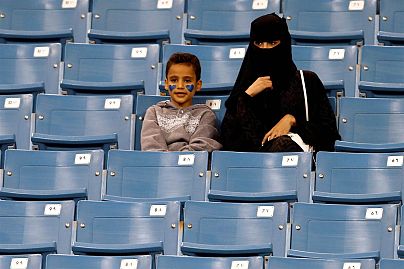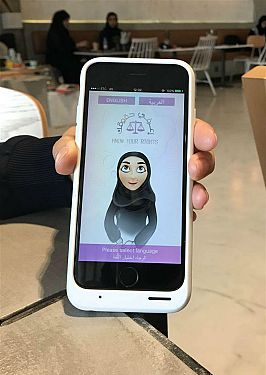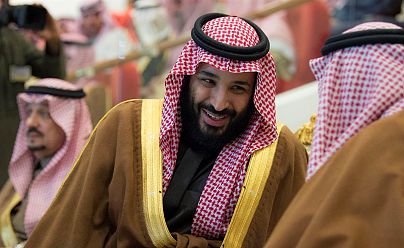Headline-grabbing announcements regarding women's rights obscure the conflicts within families and throughout society over justice and the rule of law.
At first a controlling father’s whims ruled Khadija Majrashi's life. Then a sick husband dictated her decisions. Now it’s an angry son.
"There is a conflict between the two men in my life,” Majrashi said. While her spouse now supports her working outside the home, their 22-year-old son vehemently objects.
Strife within this one family helps illustrate the struggle at the heart of Saudi Arabia, where a raft of social, political and economic changes are being driven by Crown Prince Mohammed bin Salman.
He has promised to restore "moderate, open" Islam. But headline-grabbing announcements regarding women's rights and freedoms — such as the lifting last summer of the kingdom's driving ban — obscure conflicts among relatives as well as concerns over the justice system and the rule of law.
Rights advocates say that while welcome, the innovations hailed around the world as signs that the absolute monarchy had entered the 21st century are only scratching the surface.
“All the changes that we are hearing about are economic and entertainment changes," said Nasreen Alissa, a Saudi lawyer who created the Know Your Rights app to help women navigate the confusing tangle of strictures that govern them. "The rules and regulations are the same regarding women's basic rights. Not a single thing has changed except for driving and entertainment."
The news has been good for women and girls who want to participate more in Saudi society. Women attended a soccer match for the first time this month — the latest in a series of firsts. Women are also now members of the consultative Shura Council that advises King Salman.
The labour market is also slowly opening up, with some women working outside the home. The country’s fearsome religious police have been defanged. The Saudi embassy in Washington has named a woman, Fatimah Baeshen, as its spokesperson.
But the kingdom's persistent male guardianship system is still among many women's chief complaints. Every Saudi woman has a male guardian — father, brother, husband or even son — whose permission she needs to get a passport, travel abroad and get married, for example.
Majrashi told NBC News that her movements and choices were restricted for decades by her husband, until he suffered a heart attack a few years ago. That's when he changed his conservative attitude and decided it was time for his wife to get a job.
“It was really hard with my guardians — my dad and my husband. They didn’t let me go out,” she said, describing the patchwork of laws and customs controlling the lives of Saudi women and girls.
Her son is vehemently opposed to the idea of his mother taking a bigger role outside the home and driving.
“Cars are not easy to operate — I would know,” said her son, Ali Majrashi. It isn’t just mechanics that concern the 22-year-old soldier. “I’m worried about the implications. So in a few years we'll ask them where they're going and they'll say, ‘a friend's.' Casually going out like that for no reason is not our culture."
While King Salman decreed that government agencies must not impose “arbitrary” rules on guardianship, the system still dominates the lives of millions. These rules and customs have a tangible impact on the lives of Saudi women and its economy, with the country ranking 138 out of 144 in the 2017 Global Gender Gap Report by the World Economic Forum on gender parity. That’s up from 141 the previous year.
And guardianship isn’t universally reviled. One organisation, My Guardian Knows What's Best For Me, promotes the virtues of the system that, according to one of its leaders Rawda Al Youssef, helps protect women and traditional values.
She denied that she opposed rights for women. Instead, she sought to correct the “twisted understanding of guardianship."
“I’m against the battle that has torn apart society, polarised it,” said Al Youssef, who lives in the city of Jeddah. “I am 100 percent for women’s rights but under the umbrella of the sanctity of family, society and our kingdom.”
Men and women should complement one another, she said, adding that a male guardian should be treated as a woman’s “personal consultant.”
Madawi Al-Rasheed, a Saudi academic and prominent critic of the government, has suggested that gestures toward women could well be aimed at hobbling a wider drive for political rights for all society.
“In Saudi Arabia, women were tolerated if they asked only for women’s rights,” she wrote in a recent article. “So women were only allowed to speak on behalf of women and no woman was allowed to dream a national dream. This keeps women in their own place and prevents them from joining men in demanding political rights for all.”
Human Rights Watch warns that while the government trumpets vast social changes and courts foreign leaders and business chiefs, it is lagging behind in terms of the rule of law. Dozens of dissidents, writers and clerics have been detained since September alone, according to the group.
And since 2014, most peaceful dissidents have stood trial in Saudi Arabia’s terrorism tribunal, it adds.
Most recently, the government rounded up dozens of members of the political and business elite as part of a widespread crackdown on corruption, and held them in Riyadh’s opulent Ritz Carlton hotel on the orders of the crown prince. Promoted as part of a war on corruption, which is rampant in the kingdom, the move has also been widely seen as helping the prince tighten his grip on power.
“If Mohammed bin Salman wants to show that a new era has begun in Saudi Arabia, a refreshing first step would be the release of activists and dissidents who have never been charged with a recognizable crime and should never have gone to jail in the first place,” said Sarah Leah Whitson, Middle East director at Human Rights Watch.
One such activist is liberal blogger Raif Badawi, who was imprisoned in 2012 for insulting the kingdom's powerful and ultra-conservative clerics and whose public flogging drew international condemnation. His wife, Ensaf Haidar, said the "many social reforms" regarding women were a good sign, but cautioned that they were not definitive.
“It is too early to talk about the kingdom's seriousness in carrying out radical social reforms before it actually begins to solve the great problems faced by Saudi women, the most important of which is the question of the mandate of men over women,” she said via email from Quebec, Canada, where she fled with the couple’s children after Badawi’s imprisonment.
While Haidar praised “the courage of the new decision-maker in Saudi Arabia” — referring to the powerful crown prince — she added that "the road is still long and the lesson is in the end.”
Her husband, who has been awarded a number of international awards, including the European Parliament Sakharov Prize for Freedom of Thought and PEN’s International Writer of Courage, is still in jail in spite of Salman’s pledges to sideline hard-line clerics.
“The crown prince has a historic opportunity for the actual transformation toward the building of a free, tolerant and constructive civil society,” Haidar said. “This begins by opening the cell door to Badawi and other prisoners of conscience.”














